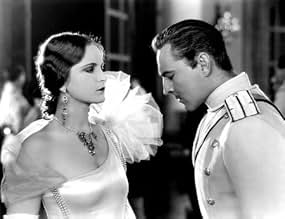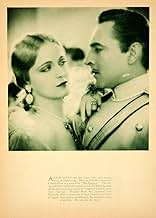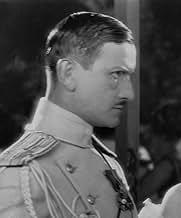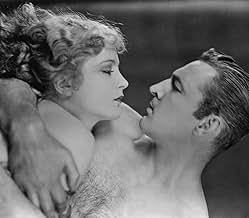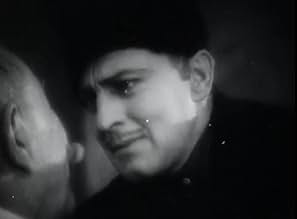अपनी भाषा में प्लॉट जोड़ेंIn Czarist Russia, a peasant officer, resented by the aristocrats, falls in love with a princess.In Czarist Russia, a peasant officer, resented by the aristocrats, falls in love with a princess.In Czarist Russia, a peasant officer, resented by the aristocrats, falls in love with a princess.
- 1 ऑस्कर जीते
- कुल 4 जीत
John Bleifer
- Soldier
- (बिना क्रेडिट के)
Albert Conti
- Commission Board Member
- (बिना क्रेडिट के)
Gregory Gaye
- Officer
- (बिना क्रेडिट के)
Lena Malena
- Tamara's Friend
- (बिना क्रेडिट के)
Michael Mark
- Soldier
- (बिना क्रेडिट के)
Dick Sutherland
- Revolutionary Board Member
- (बिना क्रेडिट के)
Wilhelm von Brincken
- Commission Board Member
- (बिना क्रेडिट के)
फ़ीचर्ड समीक्षाएं
Drama
Format: Standard 4:3, B&W, silent
Director: Sam Taylor
Starring: John Barrymore and Camilla Horn
Drew Barrymore's grandfather John is the main highlight of this film. His portrayal of Ivan Markov during 1914 Czarist Russia is ripe with excellent acting and great emotion, which flows forth from his face. Some supporting actors in this film were not too great, except for George Fawcett, who plays the commanding General of Ivan's garrison. The main problem with the characters and acting is too much fluff and too much over acting, but Barrymore is amazing.
In one scene, he is being demoted and sent to jail and the anguish coming off of his face, as they tear his medals off of his vest, is something to be seen. In another scene we see Ivan enter into madness and just the look on his face is something I won't forget for a while. While he is in prison, he begins to see images on the prison wall, which is done quite well with very good matte work for 1928.
Fawcett's character is very likeable and you enjoy seeing him every time he comes into a scene. His kindness he shows towards Ivan, from behind a rough exterior, is very believable and heart-warming. I also enjoyed Louis Wolheim as Bulba, but 3/4 of the way through the film his character changes and I didn't like that.
The story is quite good, and I worry that some of it may have been lost due to missing splices that looked like chunks of lost continuity. Right in the very beginning and especially at the very end. An excellent shot of the town opens up to a really nice story that falls apart slightly by the end, but definitely a film worth seeing. It is not great, but is very good.
8.2 (B MyGrade) = 8 IMDB.
Drew Barrymore's grandfather John is the main highlight of this film. His portrayal of Ivan Markov during 1914 Czarist Russia is ripe with excellent acting and great emotion, which flows forth from his face. Some supporting actors in this film were not too great, except for George Fawcett, who plays the commanding General of Ivan's garrison. The main problem with the characters and acting is too much fluff and too much over acting, but Barrymore is amazing.
In one scene, he is being demoted and sent to jail and the anguish coming off of his face, as they tear his medals off of his vest, is something to be seen. In another scene we see Ivan enter into madness and just the look on his face is something I won't forget for a while. While he is in prison, he begins to see images on the prison wall, which is done quite well with very good matte work for 1928.
Fawcett's character is very likeable and you enjoy seeing him every time he comes into a scene. His kindness he shows towards Ivan, from behind a rough exterior, is very believable and heart-warming. I also enjoyed Louis Wolheim as Bulba, but 3/4 of the way through the film his character changes and I didn't like that.
The story is quite good, and I worry that some of it may have been lost due to missing splices that looked like chunks of lost continuity. Right in the very beginning and especially at the very end. An excellent shot of the town opens up to a really nice story that falls apart slightly by the end, but definitely a film worth seeing. It is not great, but is very good.
8.2 (B MyGrade) = 8 IMDB.
'Tempest' gives John Barrymore plenty of chances to show his left profile. The plot -- utmost tosh, about a peasant cavalry officer obsessed with Princess Tamara during the Russian revolution -- doesn't stand up to analysis. Suffice it to say that this is one of those movies where a man keeps harassing a woman until she falls in love with him.
As Tamara, the haughty White Russian princess, Camilla Horn makes a magnificent entrance on horseback, riding sidesaddle in a form-fitting outfit with gauntlet gloves. Barrymore acquits himself well with a ridiculous script. There's one painful scene in which Lieutenant Markov (Barrymore) sups large quantities of booze to show how manly he is. Knowing what alcohol did to Barrymore's life and career, I cringe when I see him drinking on the screen.
Among the ridiculous elements is Boris de Fast as a gap-toothed Bolshevik whose ability to be conveniently present during all the plot twists (even surreptitiously entering a military stockade) borders on the supernatural. Ullrich Haupt, as Barrymore's villainous superior officer, is splendidly hissable in a role that seems tailored for Erich von Stroheim. Character actor Michael Mark plays one of the cavalry troopers: no dialogue, no business, but his distinctive facial structure calls attention to itself. Louis Wolheim supplies a bit too much comic relief as the bulbous and bull-like Bulba: I guess he must be Taurus Bulba. Wolheim plays a cavalry sergeant, but his immense bulk makes him implausible in the role; Wolheim is built more like an infantryman.
By far, the greatest appeal of this movie is Charles Rosher's dazzling camera-work, supplemented by the usual brilliant production design of William Cameron Menzies. The opening scene is a travelling shot of a military garrison: the camera is clearly panning across models, but they're as exquisitely detailed as one of those miniature villages that used to be so popular in Britain. Eventually the camera turns round a corner to show men walking past full-scale buildings ... but the cut is so well done, it's nearly seamless. Elsewhere, there's a splendid subjective shot through the bottom of an upturned glass ... and a fine example of double-exposure as the delirious Barrymore, rotting in the stockade, envisions his comrades in battle.
I was also impressed with the consistent use of dissolves whenever printed words, handwriting or inscriptions were shown on screen. As all the characters are Russian, we first see signs and captions written in Cyrillic, followed by a dissolve into English translations. (Compare this with 'The Last Command', made at a different studio this same year, in which a Russian telegram is shown on screen in English.) Just a couple of times in 'Tempest' the dissolve device is not used, and there's one bizarre shot in which a handwritten note reading 'Do not disturb' in English is posted on the same door as a sign reading 'Commissar' in Cyrillic. Still, I'm vastly impressed that the art department went to so much trouble.
Although the script is rubbish -- and I'm dismayed that the Bolsheviks are depicted favourably -- Barrymore's role has an impressive amount of moral ambiguity. Lieutenant Markov is basically moral and ethical, but he becomes obsessed with Princess Tamara ... and his behaviour degenerates accordingly. The script (and Barrymore) could have taken an easier route by contriving to make all of Markov's reversals a matter of circumstances rather than down to Markov's personal flaws.
Despite a howlingly implausible script, the visuals and the acting are so good in this film that I'll rate it 7 in 10.
As Tamara, the haughty White Russian princess, Camilla Horn makes a magnificent entrance on horseback, riding sidesaddle in a form-fitting outfit with gauntlet gloves. Barrymore acquits himself well with a ridiculous script. There's one painful scene in which Lieutenant Markov (Barrymore) sups large quantities of booze to show how manly he is. Knowing what alcohol did to Barrymore's life and career, I cringe when I see him drinking on the screen.
Among the ridiculous elements is Boris de Fast as a gap-toothed Bolshevik whose ability to be conveniently present during all the plot twists (even surreptitiously entering a military stockade) borders on the supernatural. Ullrich Haupt, as Barrymore's villainous superior officer, is splendidly hissable in a role that seems tailored for Erich von Stroheim. Character actor Michael Mark plays one of the cavalry troopers: no dialogue, no business, but his distinctive facial structure calls attention to itself. Louis Wolheim supplies a bit too much comic relief as the bulbous and bull-like Bulba: I guess he must be Taurus Bulba. Wolheim plays a cavalry sergeant, but his immense bulk makes him implausible in the role; Wolheim is built more like an infantryman.
By far, the greatest appeal of this movie is Charles Rosher's dazzling camera-work, supplemented by the usual brilliant production design of William Cameron Menzies. The opening scene is a travelling shot of a military garrison: the camera is clearly panning across models, but they're as exquisitely detailed as one of those miniature villages that used to be so popular in Britain. Eventually the camera turns round a corner to show men walking past full-scale buildings ... but the cut is so well done, it's nearly seamless. Elsewhere, there's a splendid subjective shot through the bottom of an upturned glass ... and a fine example of double-exposure as the delirious Barrymore, rotting in the stockade, envisions his comrades in battle.
I was also impressed with the consistent use of dissolves whenever printed words, handwriting or inscriptions were shown on screen. As all the characters are Russian, we first see signs and captions written in Cyrillic, followed by a dissolve into English translations. (Compare this with 'The Last Command', made at a different studio this same year, in which a Russian telegram is shown on screen in English.) Just a couple of times in 'Tempest' the dissolve device is not used, and there's one bizarre shot in which a handwritten note reading 'Do not disturb' in English is posted on the same door as a sign reading 'Commissar' in Cyrillic. Still, I'm vastly impressed that the art department went to so much trouble.
Although the script is rubbish -- and I'm dismayed that the Bolsheviks are depicted favourably -- Barrymore's role has an impressive amount of moral ambiguity. Lieutenant Markov is basically moral and ethical, but he becomes obsessed with Princess Tamara ... and his behaviour degenerates accordingly. The script (and Barrymore) could have taken an easier route by contriving to make all of Markov's reversals a matter of circumstances rather than down to Markov's personal flaws.
Despite a howlingly implausible script, the visuals and the acting are so good in this film that I'll rate it 7 in 10.
Unfortunately, this is not John Barrymore starring in William Shakespeare's "The Tempest" - rather, "This is the storm-swept romance of a poor dragoon and a proud princess - of imperial Russia - in the last calm before the red tempest of terror. The year is 1914. The hour is midnight. The place is Volinsk - a garrison town near the Austrian border," as introduced in helpful title cards.
"'Tempest' was completed at the end of the silent era, and its release was delayed until it could be equipped with recorded musical accompaniment on Vitaphone discs. Seven of the discs have survived and are synchronized here; the gaps are filled by re-editing the available sound. A new digital stereo score performed by pianist Philip Carli is the primary soundtrack," according to the "Image Entertainment" DVD sleeve, "Our digital transfer is from a print made in the early 1950s from the camera negative."
Mr. Barrymore looks remarkable hale and hearty for an actor born in the early 1880s, showing off a still enviable physique in his shirtless scenes. He is often heavily made-up, and too obviously maneuvered into as many "Great Profile" photo opportunities as possible, but his performance as the upwardly mobile Russian peasant does not disappoint. Barrymore certainly delivers.
"Sam Taylor, who helmed some of Harold Lloyd's and Mary Pickford's most successful films, is the only credited director on 'Tempest'. However, in mid-production, Taylor replaced Russian-born Lewis Milestone, who in turn had taken over from Russian émigré director Victor Tourjansky," explains Image, "The original script by Erich von Stroheim was rewritten by Milestone and much modified by C. Gardner Sullivan, a reliable craftsman who received sole screen credit. Some original aspirations for authenticity survive in the contributions of several actual White Russian officers working as small-part players and technical advisers."
The film greatest strength is the outstanding work by the United Artists assembled technical crew. Titles by George Marion Jr., art direction by William Cameron Menzies, and photography by Charles Rosher were all praised at Hollywood's first annual "Academy Awards" banquet. Marion was mentioned for his work on Colleen Moore's "Oh Kay!" Mr. Menzies won for "Tempest and "The Dove". And, Mr. Rosher was mentioned for the winning "Sunrise", Ms. Pickford's "My Best Girl" and "Tempest".
Pretty princess Camilla Horn, who impressed in F.W. Murnau's "Faust" (1926), looks like she was producer (and then lover) Joseph M. Schenck's choice to take the Greta Garbo route to super-stardom. It doesn't work, herein, but neither is Ms. Horn a deterrent. Louis Wolheim and George Fawcett are marvelous as always. The Russian-born Boris de Fast makes an excellent impression as the gap-toothed socialist peddler. If the "Oscar" category for "Supporting Actor" had existed, Mr. Wolheim might have been noted, for some combination of acting effort; he appeared in no less than four films nominated during the eligibility year.
******* Tempest (5/17/28) Sam Taylor ~ John Barrymore, Camilla Horn, Louis Wolheim, Boris de Fast
"'Tempest' was completed at the end of the silent era, and its release was delayed until it could be equipped with recorded musical accompaniment on Vitaphone discs. Seven of the discs have survived and are synchronized here; the gaps are filled by re-editing the available sound. A new digital stereo score performed by pianist Philip Carli is the primary soundtrack," according to the "Image Entertainment" DVD sleeve, "Our digital transfer is from a print made in the early 1950s from the camera negative."
Mr. Barrymore looks remarkable hale and hearty for an actor born in the early 1880s, showing off a still enviable physique in his shirtless scenes. He is often heavily made-up, and too obviously maneuvered into as many "Great Profile" photo opportunities as possible, but his performance as the upwardly mobile Russian peasant does not disappoint. Barrymore certainly delivers.
"Sam Taylor, who helmed some of Harold Lloyd's and Mary Pickford's most successful films, is the only credited director on 'Tempest'. However, in mid-production, Taylor replaced Russian-born Lewis Milestone, who in turn had taken over from Russian émigré director Victor Tourjansky," explains Image, "The original script by Erich von Stroheim was rewritten by Milestone and much modified by C. Gardner Sullivan, a reliable craftsman who received sole screen credit. Some original aspirations for authenticity survive in the contributions of several actual White Russian officers working as small-part players and technical advisers."
The film greatest strength is the outstanding work by the United Artists assembled technical crew. Titles by George Marion Jr., art direction by William Cameron Menzies, and photography by Charles Rosher were all praised at Hollywood's first annual "Academy Awards" banquet. Marion was mentioned for his work on Colleen Moore's "Oh Kay!" Mr. Menzies won for "Tempest and "The Dove". And, Mr. Rosher was mentioned for the winning "Sunrise", Ms. Pickford's "My Best Girl" and "Tempest".
Pretty princess Camilla Horn, who impressed in F.W. Murnau's "Faust" (1926), looks like she was producer (and then lover) Joseph M. Schenck's choice to take the Greta Garbo route to super-stardom. It doesn't work, herein, but neither is Ms. Horn a deterrent. Louis Wolheim and George Fawcett are marvelous as always. The Russian-born Boris de Fast makes an excellent impression as the gap-toothed socialist peddler. If the "Oscar" category for "Supporting Actor" had existed, Mr. Wolheim might have been noted, for some combination of acting effort; he appeared in no less than four films nominated during the eligibility year.
******* Tempest (5/17/28) Sam Taylor ~ John Barrymore, Camilla Horn, Louis Wolheim, Boris de Fast
Enjoyable historical drama in which The Great Profile plays a Russian peasant who rises to the rank of Lieutenant immediately before the revolution only to find himself shunned by his fellow officers and the haughty princess he falls for. Fine chemistry between Barrymore and the beautiful German actress Camilla Horn helps paper over most of the film's meagre flaws.
1928 was a year for Russian Revolution stories in Hollywood movies. Probably the best was von Sternberg's THE LAST COMMAND with Emil Jannings, Evelyn Brent and William Powell giving great performances. This piece has great performances from John Barrymore and Louis Wollheim, but the female lead, Camillia Horn, producer Joseph Schenck's mistress, gives a performance that is largely composed of staring haughtily. Well, it's the way her part is written, I suppose in this melodramatic tripe. She despises Barrymore, she loves Barrymore, she despises Barrymore, then comes the revolution....
Even uncredited directing by Lewis Milestone couldn't help. Horn can't have been a bad actress with a sixty-year career in Germany, but she made this movie and the stinker ETERNAL LOVE in Hollywood, again with Barrymore under Lubitsch's direction and returned to Germany. Maybe she stared haughtily at Schenck too often.
What is worthwhile in this film is the late silent camerawork, courtesy of Charles Rosher. The late 1920s produced camerawork that moved about like a soap bubble on the breath of imagination. The advent of sound tied it down to a neurotic adoration of the still shot that it did not begin to recover from for a quarter of a century.
But this picture features camerawork that is astonishing. The party sequence, is balletic; the prison sequences trap you in bars of darkness and Rosher backlights everyone with a star halo that still takes your breath away, even in the scratchy prints that survive. This is one every fan fan needs to watch: not for the story, which is awful, not for the performances, some of which are excellent, but for the pictures. Look at every single frame. You won't regret it.
Even uncredited directing by Lewis Milestone couldn't help. Horn can't have been a bad actress with a sixty-year career in Germany, but she made this movie and the stinker ETERNAL LOVE in Hollywood, again with Barrymore under Lubitsch's direction and returned to Germany. Maybe she stared haughtily at Schenck too often.
What is worthwhile in this film is the late silent camerawork, courtesy of Charles Rosher. The late 1920s produced camerawork that moved about like a soap bubble on the breath of imagination. The advent of sound tied it down to a neurotic adoration of the still shot that it did not begin to recover from for a quarter of a century.
But this picture features camerawork that is astonishing. The party sequence, is balletic; the prison sequences trap you in bars of darkness and Rosher backlights everyone with a star halo that still takes your breath away, even in the scratchy prints that survive. This is one every fan fan needs to watch: not for the story, which is awful, not for the performances, some of which are excellent, but for the pictures. Look at every single frame. You won't regret it.
क्या आपको पता है
- ट्रिवियाCarole Lombard was considered for the role of Princess Tamara.
टॉप पसंद
रेटिंग देने के लिए साइन-इन करें और वैयक्तिकृत सुझावों के लिए वॉचलिस्ट करें
विवरण
इस पेज में योगदान दें
किसी बदलाव का सुझाव दें या अनुपलब्ध कॉन्टेंट जोड़ें




